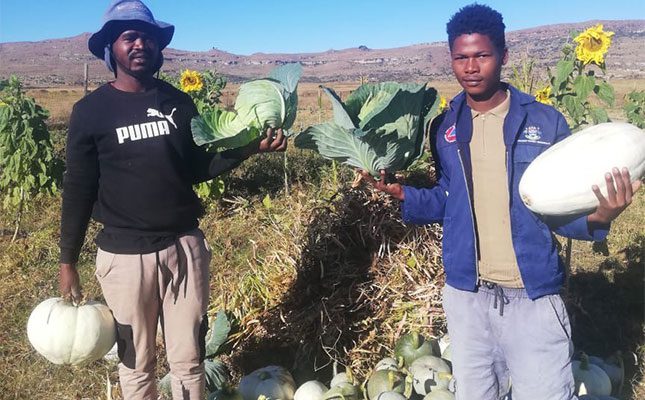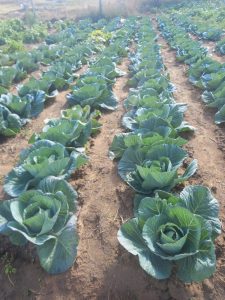
Mtshali’s love for farming was honed during his formative years and grew stronger through the years. Today, he raises poultry and grows various crops on his farm located in Nquthu, Ntanyandlovu D, in the Umzinyathi District, KwaZulu-Natal.
“I started farming at a very young age and registered my business, Feather Field Broiler Enterprise (Pty) Ltd, in June 2023. My parents successfully generated income through sales of agricultural products from the garden. But I wanted to grow my family hustle into a real business,” says Mtshali.
Driven by a desire to improve his farming skills and business knowledge, Mtshali discovered the Metropolitan Collective Shapers programme through Ukhozi FM and decided to join.
“Ultimately, I saw the programme as a way to unlock new opportunities for my enterprise and contribute more effectively to my community’s food security and economic development,” explains Mtshali.
Feather Field Broiler Enterprise focuses on poultry production and crop farming. According to Nduduzo, they raise broiler and layer chickens from day-old chicks until they are ready for meat or egg production.
“Alongside poultry, we grow vegetables and seasonal grains such as maize and beans using organic methods. Our goal is also to provide fresh, local, and naturally grown produce to boost food security in our community. We utilise chicken manure from one division of the business to improve soil health and crop yields,” he explains.
Mtshali uses a diverse marketing strategy that includes all levels in the community. He explains that while products are sold directly from the farm to local customers, they also use a variety of informal and formal channels:
- Sells to local households. “We particularly focus on individuals and families who buy fresh chicken meat, eggs, and vegetables for daily consumption.”
- Sells to small retailers such as street vendors and spaza shops.
- Provides produce to local schools and feeding schemes. “These institutions require bulk and affordable food supplies, and I am happy to say that we are able to also supply their needs.”
- Small restaurants and tuckshops also depend on fresh, locally sourced ingredients at affordable prices, this is also a market that they target with their produce.
- There are always community members that are interested in live chickens, so they also cater to those needs. “We often receive special orders for events such as community gatherings, funerals, or cultural ceremonies that need live or slaughtered chickens in bulk.”
- For seasonal products such as grain and beans, they depend on Agri-markets and cooperatives as an off-set point.
Building market demand
To create a pull in the market, they use a combination of word-of-mouth marketing, local networking, as well as digital platforms to market the products.
“Satisfied customers refer others within the community, and this is a great way to build our reputation. On our Facebook page, we are able to show products, share updates, and receive orders. We also use WhatsApp Business to communicate with regular clients, take orders, and send price lists or promotions,” says Mtshali.
To ensure that their farm is visible to passers-by, or to those who need to collect products, they have a clear road signage, which helps to attract walk-in customers.
He adds that farming allows him to create and build something from the ground up, and to turn small resources into something tangible – real and valuable food for his community.
“I enjoy watching the chicks grow into healthy broilers or layers, and to see how our organic methods improve the land and increase crop yields over time.”
According to him, limited access to water for irrigation purposes is one of his biggest challenges.
“We currently rely on buckets and watering cans to fetch water from a nearby river. This is time-consuming and limits how much land we can cultivate, especially during dry periods.”
Another major challenge, he says, is the lack of proper fencing in the area. “Most of the land is either unfenced or poorly fenced, which allows cattle and other livestock to enter the fields and destroy our crops. This leads to loss of production and discourages expansion efforts.”
Personal challenges
Regarding personal challenges, he notes that he does not have sufficient capital to invest in key infrastructure like irrigation systems, proper fencing, poultry housing, or tools to improve production and efficiency.
He emphasises that these challenges affect productivity, consistency, and growth. “We continue to work with what we have, while looking for ways to improve our infrastructure.”
He would like to gain access to larger markets so that he can grow the business and secure better prices for the products. Transport and logistics also present additional challenges.
“I struggle with reliable transport to deliver products to markets or collect inputs like feed, seed, and packaging.”
Agronomic and business skills are also aspects that he would like to address.
“Although I have completed short courses in poultry and vegetable production, I still need more technical training, especially in record keeping, financial planning, pest control, and sustainable crop rotation. But, despite these challenges, I am committed to learning, improving, and growing my enterprise step by step.”
While keeping everything together with what he has, he dreams of installing a proper irrigation system, fencing the entire farming area to protect his crops and ensure better land management, and building proper poultry structures with better ventilation.
He also wishes to enhance his marketing and branding efforts.
“I would like to create a label and improve packaging, as well as increase my online presence to attract more customers.”
These improvements, he believes, will help transform his operation from a small-scale venture into a professional, reliable, and sustainable farming business, eventually opening a farm shop.
“My dream is to grow Feather Field Broiler Enterprise into a fully developed, sustainable agricultural business that creates jobs, supports local food security, and becomes a supplier of choice in my region.”
Mentor aspiring farmers
Mtshali’s dreams are not all about his own business. He wishes to start an agro-training programme in which he can mentor other aspiring farmers.
“Ultimately, I want my business to become a beacon of hope and development in my community, showing that even with limited resources, growth is possible through hard work and vision.
“I was proud to be selected as one of the Top 10 finalists in the Metropolitan Collective Shapers’ programme. This achievement boosted my confidence and validated the hard work I am putting into my farming enterprise. It also helped me gain new skills, expand my network, and receive valuable feedback that I am now applying to improve my business operations and growth plans.”
He says he enjoyed the agricultural production and business management module the most, as it gave him practical knowledge on improving poultry and crop production, while also teaching him important skills in record keeping, financial planning, and marketing.”
He adds that the programme helped him build a strong network of like-minded entrepreneurs.
“Being selected as a Top 10 finalist showed me that my efforts are recognised, and this has inspired me to keep improving and growing my enterprise.”
“I plan to continue refining these skills, seek further training opportunities, and implement best practices to grow my farming enterprise sustainably and professionally. I hope similar programmes continue to be available to empower more young farmers and entrepreneurs like me.”
Get trusted farming news from Farmers Weekly in Google Top Stories.
➕ Add Farmers Weekly to Google ✔ Takes 10 seconds · ✔ Remove anytime









